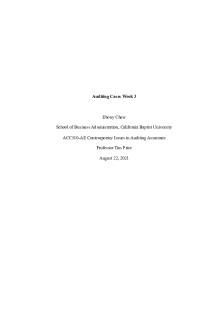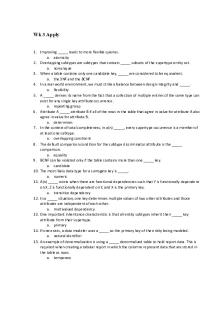Auditing Case 3 Wk 3 - Grade: A+ PDF

| Title | Auditing Case 3 Wk 3 - Grade: A+ |
|---|---|
| Author | Ebony Chew |
| Course | Contemporary Issues in Auditing Assurance |
| Institution | California Baptist University |
| Pages | 4 |
| File Size | 92.5 KB |
| File Type | |
| Total Downloads | 35 |
| Total Views | 148 |
Summary
Choose a case specifically in the book and elaborate on it by answering the questions at the end of the case....
Description
Auditing Cases Week 3
Ebony Chew School of Business Administration, California Baptist University ACC510-AE Contemporary Issues in Auditing Assurance Professor Tim Price August 22, 2021
Chapter 3 Case 3.2 Howard Street Jewelers, Inc. 1. Identify the internal control concepts that the Levis overlooked or ignored. Levi ignored segregation of duties Betty had too many responsibilities for one person to handle. She was handling the cash, cash receipts, and sales records (Knapp, 2018, p. 216). One person should not be performing the following: authorizing transactions and maintaining custody over the assets, and she should have not been recording the transaction while doing all the other duties (Knapp, 2018, p. 216). Betty was allowed to sell jewelry, put items on layaway, maintain cash receipts and accept the cash, and record the sales. Betty was allowed to have all these duties that allowed her to commit fraud of $350,000 (Knapp, 2018, p. 216). 2. When Lore informed the CPA of her suspicions regarding Betty, what responsibilities, if any, did the CPA have to pursue this matter? Alternately, assume that, in addition to preparing tax returns for Howard Street Jewelers, the CPA (a) audited the business’s annual financial statements, (b) reviewed the annual financial statements, and (c) compiled the annual financial statements. The CPA who served as Levi’s accountant for almost 40 years provided a wide range of accounting and business issues. The CPA had the responsibility to pursue the matter; however, it is dependent on the time of this fraud relating to what services were provided by the CPA (Knapp, 2018, p. 215). Assuming that the CPA was only providing tax services, the CPA does not have the responsibility to pursue the matter (AICPA, n.d., p. 1). If the CPA was performing an audit, review, or compilation, then he/she is liable in these circumstances. The CPA can have common law liability and statutory law liability depending on the circumstances (AICPA, n.d., p. 1).
3. Assume that you have a small CPA firm and have been contacted by a husband and wife, John and Myrna Trubey, who are in the final stages of negotiating to purchase a local jewelry store. John will prepare jewelry settings, size jewelry for customers, and perform related tasks, while Myrna will be the head salesclerk. The Trubeys intend to retain four of the current employees of the jewelry store—two salesclerks, a cashier, and a college student who cleans the store, runs errands, and does various other odd jobs. They inform you that the average inventory of the jewelry store is $200,000 and that annual sales average $800,000, 30 percent of which occur in the six weeks prior to Christmas. One way of controlling inventory is to keep every case containing jewelry locked, with only authorized personnel having keys to them. Any jewelry not in locked display cases should be kept locked in a vault (Bentley-Goode, Newton & Thompson, 2017, p. 60). The cashier should be the only person with access to the cash register. Another person, preferably one of the Trubeys should check the cash every night to make sure it matches the cash receipts. Pre-numbered sales forms should be used to ensure that no sales are misappropriated, and a salesperson should write up the sale, then hand it over to the cashier for the customer to pay. These are just a few ways to minimize losses through the use of internal controls (Bentley, Goode, Newton & Thompson, 2017, p. 60). Bible Verse Proverbs 24:27, “Prepare his or her work outside; get everything ready for yourself in the field, and after that build your house.” The verse relates to the case as people must understand God has called them to work and that they must work for the good of the world and the glory of God.
References A. (n.d.). What auditors need to know about state 'blue sky' laws. Retrieved August 22, 2021, from https://future.aicpa.org/resources/article/what-auditors-need-to-know-about-stateblue-sky-laws Bentley-Goode, K. A., Newton, N. J., & Thompson, A. M. (2017). Business strategy, internal control over financial reporting, and audit reporting quality. Auditing: A Journal Of Practice & Theory, 36(4), 49-69. doi:10.2308/ajpt-51693 Knapp, M. (2018). Contemporary auditing: Real issues and cases, 11th ed. Mason, OH: SouthWestern Cengage Learning. ISBN-13: 9781305970816...
Similar Free PDFs

Auditing Case 3 Wk 3 - Grade: A+
- 4 Pages

WK 3 - wk 3 summary
- 5 Pages

Case 3 - Grade: B
- 2 Pages

Case study 3 cis - Grade: A
- 3 Pages

Essay 3 - Grade: A
- 3 Pages

Auditing ass 3 part 3
- 2 Pages

Module 3.,, - Grade: A
- 14 Pages

Paper 3 - Grade: A
- 3 Pages

Experiment 3 - Grade: A
- 11 Pages

Comparison #3 - Grade: A
- 1 Pages

Essay 3 - Grade: A+
- 12 Pages

Wk 3 Apply - Assingment
- 3 Pages

Auditing Theory 3
- 24 Pages

YOY Essay 3 - Grade: A
- 2 Pages

Reflection Paper #3 - Grade: A
- 8 Pages

Lab Report 3 - Grade: A+
- 10 Pages
Popular Institutions
- Tinajero National High School - Annex
- Politeknik Caltex Riau
- Yokohama City University
- SGT University
- University of Al-Qadisiyah
- Divine Word College of Vigan
- Techniek College Rotterdam
- Universidade de Santiago
- Universiti Teknologi MARA Cawangan Johor Kampus Pasir Gudang
- Poltekkes Kemenkes Yogyakarta
- Baguio City National High School
- Colegio san marcos
- preparatoria uno
- Centro de Bachillerato Tecnológico Industrial y de Servicios No. 107
- Dalian Maritime University
- Quang Trung Secondary School
- Colegio Tecnológico en Informática
- Corporación Regional de Educación Superior
- Grupo CEDVA
- Dar Al Uloom University
- Centro de Estudios Preuniversitarios de la Universidad Nacional de Ingeniería
- 上智大学
- Aakash International School, Nuna Majara
- San Felipe Neri Catholic School
- Kang Chiao International School - New Taipei City
- Misamis Occidental National High School
- Institución Educativa Escuela Normal Juan Ladrilleros
- Kolehiyo ng Pantukan
- Batanes State College
- Instituto Continental
- Sekolah Menengah Kejuruan Kesehatan Kaltara (Tarakan)
- Colegio de La Inmaculada Concepcion - Cebu